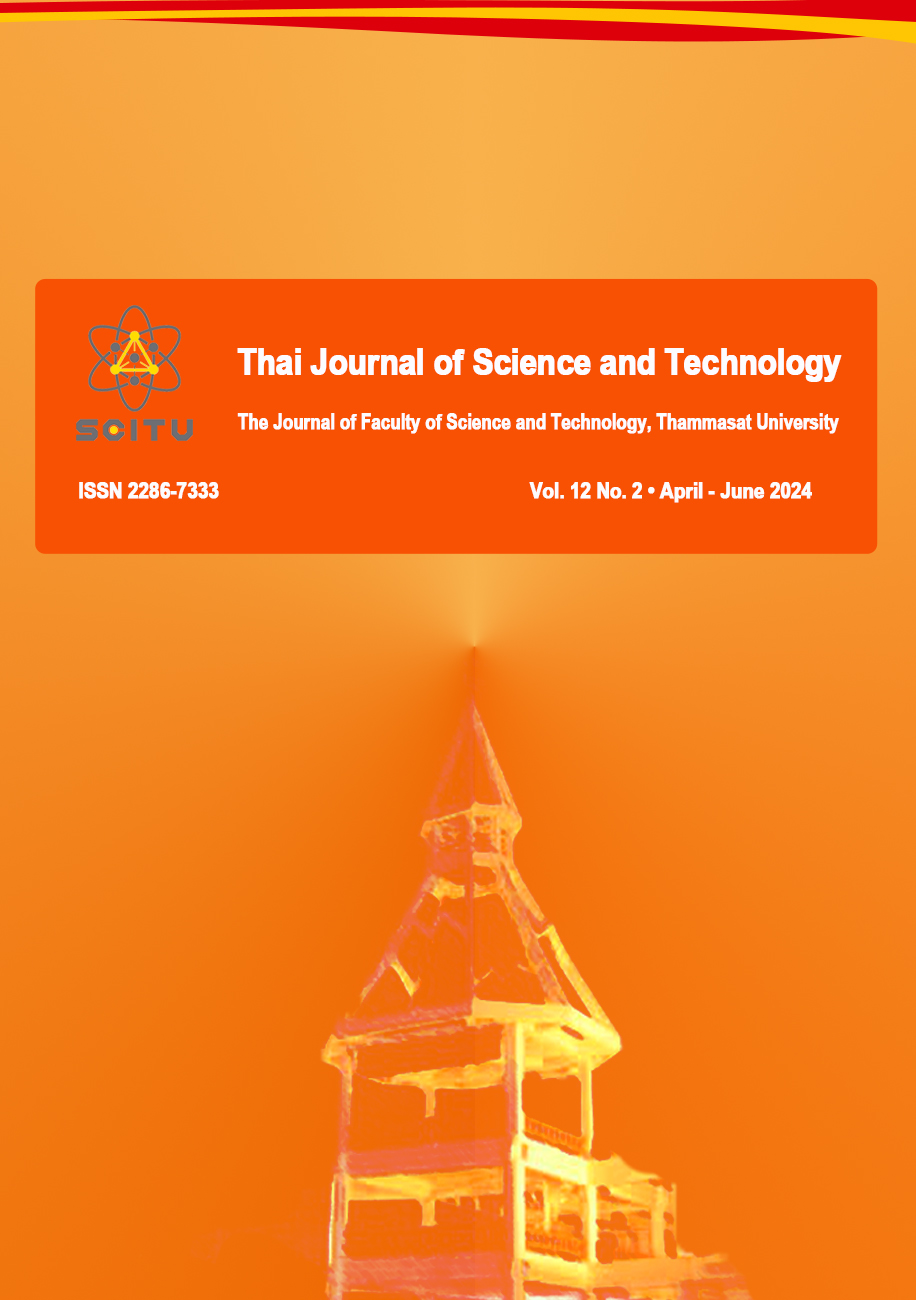Case Study: Post-Concussion Symptoms Management in Patients with Mild Traumatic Brain Injury
Main Article Content
Abstract
The commonest form of traumatic brain damage is mild traumatic brain injury. When the head is struck by something external, brain tissue and blood vessel damage may ensue, leading to inflammation and post-traumatic stress disorder (PTSD), negatively impacting patient life quality. This paper describes nursing procedure for managing mild traumatic brain injury patients' post-concussion symptoms. A nursing case study is examined of an adult male patient who suffered injuries when a truck tire exploded. He was admitted to Thammasat Hospital's Trauma Surgical Ward, where he presented with headache, nausea, dizziness, exhaustion, and insomnia, among other symptoms. Nursing care was given to the patient with and without medication. The headache, nausea, dizziness, and weariness symptoms were resolved through nursing care and in less than seven days, sleep patterns regularized. This method may help stakeholders treating patients with mild traumatic brain injuries to alleviate post-concussion symptoms through nursing care and achieve greater comfort.
Article Details

This work is licensed under a Creative Commons Attribution-NonCommercial-NoDerivatives 4.0 International License.
บทความที่ได้รับการตีพิมพ์เป็นลิขสิทธิ์ของคณะวิทยาศาสตร์และเทคโนโลยี มหาวิทยาลัยธรรมศาสตร์ ข้อความที่ปรากฏในแต่ละเรื่องของวารสารเล่มนี้เป็นเพียงความเห็นส่วนตัวของผู้เขียน ไม่มีความเกี่ยวข้องกับคณะวิทยาศาสตร์และเทคโนโลยี หรือคณาจารย์ท่านอื่นในมหาวิทยาลัยธรรมศาสตร์ ผู้เขียนต้องยืนยันว่าความรับผิดชอบต่อทุกข้อความที่นำเสนอไว้ในบทความของตน หากมีข้อผิดพลาดหรือความไม่ถูกต้องใด ๆ
References
Aiadsuy, N., Kanbuala, W.,&Jungul,S. (2020). The Effect of a Post-Concussion Symptoms Management Program on Functional Performance in Patients with Mild Traumatic Brain Injury. The Journal of Faculty of NursingBurapha University, 28(4),49-62.
Andelic, N., Howe, E.I., Hellstrøm, T., Sanchez, M.F., Lu, J., Løvstad, M., & Røe, C. (2018). Disability and quality of life 20 years after traumatic brain injury. Brain and behavior, 8(7),1-10.
Bureau of Highway Safety, Department of Highways. (2023). Traffic Accident on National Highways in 2023. 16 June2024. Retrieved from: https://bhs.doh.go.th/files/accident/66/report_accident_2566.pdf
Dams-O’Connor, K., Sy, K., Landau, A., Bodien, Y., Dikmen, S., Felix, E.R., ... Whiteneck, G. (2018). The feasibility of telephone-administered cognitive testing in individuals 1and 2years after inpatient rehabilitation fortraumatic brain injury. Journal of neurotrauma, 35(10), 1138-1145.
Deethongkham, D. (2015). Relationship between post concussion symptoms and functional performance in patients with mild traumatic brain injury. In Proceedings The 5th national and international graduate study conference. (pp. 3093-3107) Bangkok: Silpakorn university. [In Thai]
Dewan, M.C., Rattani, A., Gupta, S., Baticulon, R.E., Hung, Y.C., Punchak, M., Agrawal, A., Adeleye, A.O., Shrime, M.G., Rubiano, A.M., Rosenfeld, J.V., & Park, K.B. (2018). Estimating the global incidence of traumatic brain injury. Journal of neurosurgery, 130(4), 1080–1097.
Emeot, Y. (2020). Rehabilitation postconcussion syndrome in mild traumatic brain injury: Nurse’s role. Journal of Nursing Division, 47(1), 1-10.
Emeot, Y., Khuwatsamrit, K.,& Chaivaiboontham, S. (2020). Effects of The Self-Care Agency Promoting Program on Knowledge, Self-CareAbility Perceived Post Concussion Symptoms, and Recovery romBrain injury in Patients with Mild Traumatic Brain Injury. Nursing Journal of The Ministry of Public Health, 30(3), 207-222.
King, N.S., Crawford, S., Wenden, F.J., Moss, N.E., & Wade, D.T. (1995). The Rivermead Post Concussion Symptoms Questionnaire: a measure of symptoms commonly experienced after head injury and its reliability. Journal of Neurology, 242(9), 587-592.
Kinklaykan K. (2018). FactorsRelatingtoPost Concussion Syndromein Mild Brain Injury Patients. ChulalongkornUniversityThesesandDissertations(ChulaETD). 3095. 16 February 2024, Retrieved from: https://digital.car.chula.ac.th/chulaetd/3095/
Lundin, A., de Boussard, C., Edman, G., & Borg, J. (2006). Symptoms and disability until 3 months after mild TBI. Brain injury, 20(8), 799–806.
Ponsford, J., Nguyen, S., Downing, M., Bosch, M., McKenzie, J.E., Turner, S., Chau, M., Mortimer, D., Gruen, R.L., Knott, J., & Green, S. (2019). Factors associated with persistent post-concussion symptoms following mild traumatic brain injury in adults. Journal of rehabilitation medicine, 51(1), 32–39.
Premsai T. (2023). Follow up study of patient’s adaptation after mild head injury. (Master's Degree). Mahidol University, Bangkok. (In Thai).
Roe, C., Sveen, U., Alvsaker, K., & Bautz-Holter, E. (2009). Post-concussion symptoms after mild traumatic brain injury: influence of demographic factors and injury severity in a 1-year cohort study. Disabil Rehabil, 31(15), 1235-1243.
Tator, C.H., Davis, H.S., Dufort, P.A., Tartaglia, M.C., Davis, K.D., Ebraheem, A., & Hiploylee, C. (2016). Post-concussion syndrome: demographics and predictors in 221 patients. Journal of neurosurgery, 125(5), 1206–1216.
Uthaisang, A., Kaewpolngam, P., Sanlad, K., Singthong, K., Jangsanam, K., Prompap, K., ... & Sapimon,K. (2020). The Effect of Cold Herbal Gel Pack Compress to Release Post Traumatic Headache of Patients with Mild Traumatic Brain Injury. Srinagarind Medical Journal, 35(2), 217-223.
Vas, A., Chapman, S., Aslan, S., Spence, J., Keebler, M., Rodriguez-Larrain, G., Rodgers, B., Jantz, T., Martinez, D., Rakic, J., & Krawczyk, D. (2016). Reasoning training in veteran and civilian traumatic brain injury with persistent mild impairment. Neuropsychological rehabilitation, 26(4), 502–531.
World Health Organization: WHO. (2023). Global status report on road safety 2023. 16 February 2024. Retrieved from: https: //drive.google.com/drive/folders/1M_uVWpqmV3QB1H-owMFCbw0DLFiin2rC


